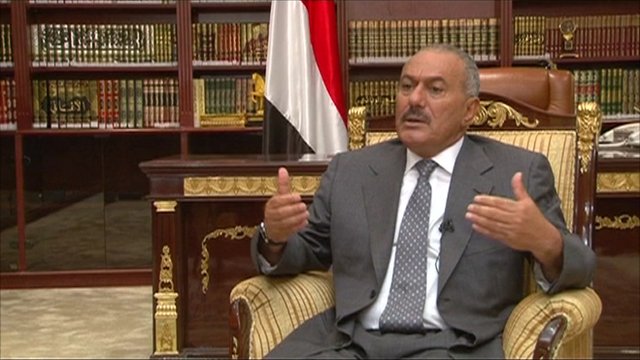 Yemeni opposition parties have welcomed a plan under which President Ali Abdullah Saleh would stand down after 30 days, but protesters are still pressing for his immediate departure.
Yemeni opposition parties have welcomed a plan under which President Ali Abdullah Saleh would stand down after 30 days, but protesters are still pressing for his immediate departure.President Saleh agreed to leave power under a transition plan aimed at ending violent unrest over his 32-year rule.
Under the plan, Mr Saleh and his family would gain immunity from prosecution.
In an interview with the BBC, Mr Saleh described the protests against him as a "coup".
He also said al-Qaeda had infiltrated protest camps and this would have dangerous implications for Western countries.
The transition plan was drawn up by Gulf Arab states belonging to the Gulf Co-operation Council (GCC).
Under it, Mr Saleh would hand over to his vice-president one month after an agreement is signed with the opposition, and presidential elections would follow a month later.
'Comprehensive change'
The ruling General People's Congress party accepted the plan late on Saturday.
Parliamentary opposition parties welcomed the plan but said they would not join a transitional government before Mr Saleh left office, as provided for by the plan.
The opposition has also previously insisted it will not accept immunity from prosecution for Mr Saleh and his family.
Activists in the capital, Sanaa, continued to protest after the plan was announced.
"There is a consensus on rejecting the initiative," said one prominent activist, Abdulmalik al-Yusufi.
"The Gulf initiative addresses the problem as if it was a political crisis between two parties," he said.
"We have taken to the streets in a revolution that is demanding a comprehensive change."
In an interview with the BBC on Sunday, Mr Saleh represented the protest movement as a coup.
"You call on me from the US and Europe to hand over power," he said.
"Who shall I hand it over to? Those who are trying to make a coup? No. We will do it through ballot boxes and referendums. We'll invite international observers to monitor - but a coup is not acceptable."
'Very dangerous'
He also claimed that Islamist extremists had infiltrated protest camps.
"Al-Qaeda are moving inside the camps and this is very dangerous," he said. "Why is the West not looking at this destructive work and its dangerous implications for the future?"
At least 120 people have died during two months of protests inspired by uprisings elsewhere in the Arab world.
Yemen is the Arab world's most impoverished nation and, even before the current protests, it was becoming increasingly chaotic, with both al-Qaeda and separatist challenges to the government's authority.
Mr Saleh suffered a major political reversal last month when a slew of ministers and ambassadors resigned in protest at the shooting of 45 people at a demonstration in Sanaa.
The president promised earlier not to renew his presidency in 2013 or hand over to his son. He has made - and broken - similar promises in the past.
The US welcomed the announcement of the GCC transition plan. A statement from the White House urged all parties to "swiftly" implement a peaceful transfer of power.



